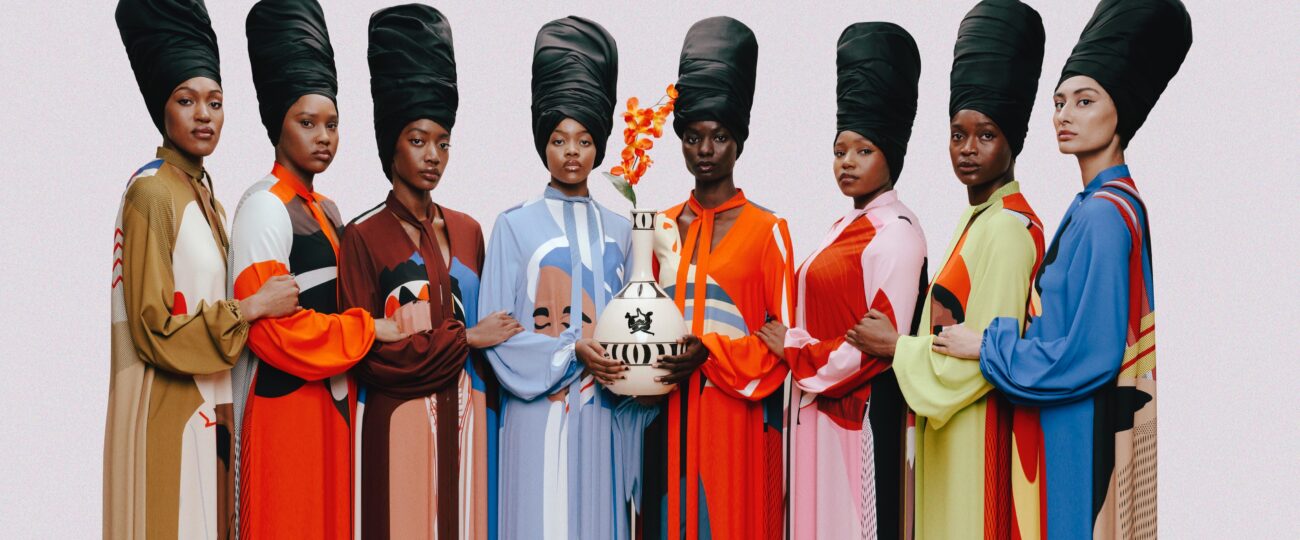African fashion is more than fabric and thread. It’s a story stitched into every garment, a reflection of culture, history, resistance, pride, and creativity. Whether it’s a vibrant Ankara dress, a handwoven Kente cloth, or a modern twist on a traditional Agbada, African fashion tells the world, “This is who we are.”
What’s especially exciting today is how African fashion is taking the world by storm. From Paris to Lagos, New York to Nairobi, designers and creatives are blending the traditional with the contemporary—bringing African aesthetics into the global spotlight.
In this article, we dive deep into the world of African fashion: its roots, its rise, its key players, and why it’s more than just a trend—it’s a movement.
A Rich History Woven in Fabric
Long before fashion weeks and designer runways, African communities were creating clothing rich with symbolism, meaning, and craft. Across the continent, textiles were used to communicate status, culture, and spirituality.
Key traditional fabrics include:
-
Kente (Ghana): Each color and pattern has meaning, often worn during ceremonies and special occasions.
-
Mudcloth / Bogolanfini (Mali): Hand-dyed with fermented mud, often used in storytelling and art.
-
Shweshwe (South Africa): Brightly patterned cotton used in Xhosa traditional wear.
-
Adire (Nigeria): Tie-dye indigo fabric with Yoruba origins.
These weren’t just clothes—they were living artifacts, passed through generations, used in rites of passage, weddings, funerals, and festivals.
The Modern African Fashion Renaissance
Fast forward to the 21st century, and African fashion has exploded into something global, innovative, and unstoppable.
A new wave of designers, photographers, stylists, and models are pushing boundaries. They are redefining what African fashion means, not only for Africans but for the world.
Key trends in the modern scene:
-
Afro-futurism: A mix of traditional African motifs with futuristic designs—bold, edgy, and expressive.
-
Sustainable fashion: Many African brands prioritize local sourcing, ethical labor, and zero-waste practices.
-
Cultural remixing: Traditional attire like dashikis or headwraps being reimagined in streetwear and haute couture.
-
Gender fluidity: Modern African fashion often embraces fluidity in silhouettes and styles, challenging global fashion norms.
What’s powerful is that African fashion isn’t just “following” trends—it’s setting them.
Fashion Capitals of Africa
While fashion is thriving across the continent, a few cities have emerged as creative powerhouses:
1. Lagos, Nigeria
Home to fashion week, style influencers, and world-class designers like Lisa Folawiyo, Orange Culture, and Tokyo James. Lagos is loud, bold, and unapologetically stylish.
2. Nairobi, Kenya
Known for eco-fashion, beadwork, and colorful patterns. Brands like KikoRomeo are mixing heritage with contemporary wear.
3. Dakar, Senegal
With its vibrant art scene and love for tailoring, Dakar is where elegance meets Afro-boho.
4. Accra, Ghana
A hub for Kente reimagined in streetwear and elegant gowns. Designers like Christie Brown bring modern flair to traditional pride.
5. Cape Town, South Africa
Where avant-garde meets multicultural influence. Cape Town’s fashion scene blends heritage, high fashion, and global chic.
Designers to Watch
African designers are no longer working in the shadows of Western fashion—they’re shining in their own light.
Here are a few names you should know:
-
Thebe Magugu (South Africa): LVMH Prize winner whose work tells African stories through cutting-edge fashion.
-
Mowalola Ogunlesi (Nigeria): Designer to Kanye West and known for bold, edgy streetwear.
-
Imane Ayissi (Cameroon): The first Sub-Saharan African designer to show at Paris Haute Couture Week.
-
Maxhosa by Laduma (South Africa): Blending Xhosa aesthetics with knitwear mastery.
These designers aren’t just talented—they’re global storytellers, representing Africa on the biggest fashion stages.
African Fashion in Global Culture
The influence of African fashion on global style has never been more visible.
From celebrities to red carpets:
-
Beyoncé rocked African designers in her visual album “Black Is King.”
-
Naomi Campbell, a longtime champion of African fashion, frequently features designers from the continent.
-
Lupita Nyong’o, Wizkid, Tems, and others have brought African designers to the world stage.
Even mainstream brands like Dior, Louis Vuitton, and Balmain are borrowing African motifs—but this also raises important questions about cultural appropriation vs. appreciation.
The message is clear: Africa isn’t just influencing fashion—it is fashion.
The Rise of African Fashion Weeks
Across the continent, fashion weeks are creating platforms for visibility, collaboration, and commerce.
Major events include:
-
Lagos Fashion Week (Nigeria)
-
South African Fashion Week (Johannesburg)
-
Swahili Fashion Week (Tanzania)
-
Accra Fashion Week (Ghana)
-
Arise Fashion Week (Nigeria)
These events spotlight new talent, attract global buyers, and give young creatives a voice and a runway.
Thanks to social media, a new generation of African fashion lovers are watching, sharing, and buying these styles—from smartphones in Accra to boutiques in London.
Fashion and Identity
For many Africans, clothing is more than personal style—it’s an act of identity, resistance, and pride.
Wearing African prints or traditional attire is often a statement that says:
-
“I know who I am.”
-
“I honor my heritage.”
-
“I won’t be erased.”
Across diasporas, wearing African fashion has also become a way to reconnect with cultural roots, especially for those rediscovering identity after generations of displacement.
Challenges in the African Fashion Industry
While the creativity is overflowing, the industry still faces serious hurdles:
-
Limited funding and infrastructure for manufacturing.
-
Lack of access to global markets and buyers.
-
Counterfeit imports of African prints made cheaply overseas.
-
Underrepresentation in global fashion media and runways.
But where there are challenges, there are also opportunities—and African designers are meeting them head-on with innovation, collaboration, and grit.
How You Can Support African Fashion
Whether you’re on the continent or in the diaspora, there are so many ways to support and celebrate African fashion:
-
Buy from African brands. Support local tailors, designers, and online stores.
-
Follow and amplify African creatives on social media.
-
Wear your culture proudly. Whether it’s at a wedding or a night out—make a statement.
-
Learn the stories behind the fabrics, symbols, and styles.
-
Support ethical fashion by choosing brands that honor workers and the environment.
Every purchase, post, or compliment can help build an ecosystem that uplifts African creatives.
Africa Is the Future of Fashion
African fashion is more than a look—it’s a movement rooted in pride, history, and innovation. It’s about reclaiming narratives, empowering local economies, and reshaping how the world sees style.
At Afriker.com, we celebrate this revolution. Because African fashion isn’t just trending—it’s timeless.
So whether you’re rocking a bold Ankara bomber jacket, a flowing Boubou, or a sleek Kente corset—wear it with pride. You’re not just dressing up. You’re showing up for culture, creativity, and community.

